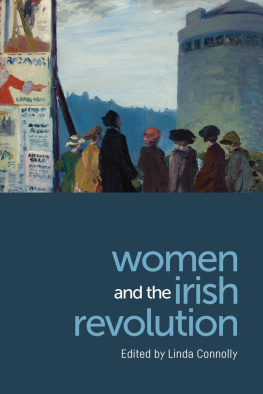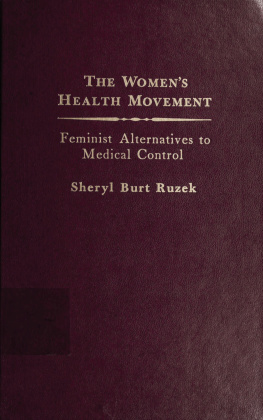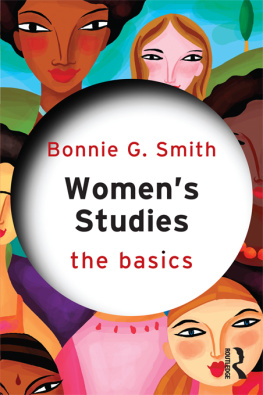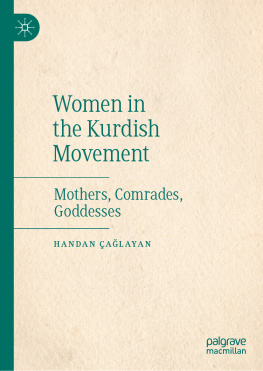


Published by
The Feminist Press
at The City University of New York
The Graduate Center,
365 Fifth Avenue, New York, NY 10016.
www.feministpress.org
First edition, 2000
Compilation and preface copyright 2000 by Florence Howe
Introduction copyright 2000 by Mari Jo Buhle
All essays copyright 2000 in the names of their respective authors.
No part of this book may be reproduced or used, stored in any information retrieval system, or transmitted in any form or by any means, electronic, mechanical, photocopying, recording, or otherwise, without prior written permission from The Feminist Press at The City University of New York except in the case of brief quotations embodied in critical articles and reviews.
LIBRARY OF CONGRESS CATALOGING-IN-PUBLICATION DATA
The politics of womens studies: testimony from thirty founding mothers/edited by
Florence Howe; introduction by Mari Jo Buhle.1st ed.
p. cm.(The womens studies history series; v. I)
Includes bibliographical references and index.
ISBN: 978-1-55861-786-5
1. Womens studiesUnited StatesHistory. 2. Women scholarsUnited StatesHistory. 3. Discrimination in educationUnited States. 4. Feminism and educationUnited States. I. Howe, Florence. II. Series.
HQ1181.U5 P65 2000
305.4 '071 '173dc21 00-044251
The Feminist Press would like to thank the Ford Foundation and Mariam K. Chamberlain, Blanche Wiesen Cook, Helene D. Goldfarb, Jane Gould, William Hedges, Dorothy O. Helly, Nancy Hoffman, Florence Howe, Joanne Markell, Caroline Urvater, and Genevieve Vaughan for their generosity in supporting this book.
Photograph of Gloria Bowles (1990s) Joanne Margalit. Used by permission of photographer. Photograph of Johnnetta B. Cole (1970s) Arlene Voski Avakian. Used by permission of photographer. Photograph of Johnnetta B. Cole (1990s) Emory University Photography. Used by permission of photographer. Photograph of Mimi Reisel Gladstein (1990s) Cynthia Farah. Used by permission of photographer. Photograph of Nona Glazer (1995) Robert Shotola. Used by permission of photgrapher. Photograph of Elizabeth Lapovsky Kennedy (1997) Margaret Randall. Used by permission of photographer. Photograph of Annis Pratt (1970s) Ann A. Straky. Used by permission of photographer. Photograph of Annis Pratt (1990s) Olan Mills. Used by permission of photographyer. Photograph of Barbara Smith (1990s) Marilyn Humphries. Used by permission of photographer. Photograph of Margaret Strobel (1970s) Deborah Rosenfelt. Used by permission of photographer. Photograph of Margaret Strobel (1997) Roberta Dupuis-Devlin, UIC Photo. Used by permission of photographer.
All other photographs used by permission of their subjects. Credits: Electa Arenal (1970s) by Gerald Cyrus, GSUCCUNY; (1990s) by Magda Bogin. Nancy Topping Bazin (1972) by Barbara Flynn; (1999) by Andrew Carney. Josephine Donovan (1972) by Lexington Herald-Leader; (1999) by University of Maine Photography. Tucker Pamella Farley (1960s) by Emily Jensen; (1990s) by Linda Plotkin. Sue-Ellen Jacobs (1969) by Bill Jacobs; (1999) by Wesley Thomas. Nancy Porter by Joanne Penton. Kathryn Kish Sklar by Sara Krulwich.
Text design and typesetting by Adam B. Bohannon
Printed on acid-free paper by Transcontinental Printing.
08 07 06 05 04 03 02 01 00 5 4 3 2 1
To the founding mothers
who could not write their essays
for this volume
SHAUNA ADIX
(19321998)
University of Utah
BETTY CHMAJ
(19301997)
Sacramento State University, California
ELAINE HEDGES
(19271997)
Towson State University, Maryland
JUDITH OCHSHORN
(19281995)
University of South Florida
CAROL OHMANN
(19281989)
Wesleyan University
JUANITA WILLIAMS
(19221991)
University of South Florida
Contents
These narratives record history that few people in or out of womens studies have heard. They are private accounts of public acts requiring imagination and intelligence as well as courage. They are accounts of the agents of social change, who, in the space of a single decade, transformed consciousness on college and university campuses. To do this work, they did not often march in the streets of a town; they did not often conduct sit-ins in buildings. But in various strong, systematic, and strategic ways, they organized collective feminist power on campuses. They are part of a significant story that needs to be known, even in a dozen volumes the size of this one. For on hundreds of campuses in the 1970s and on hundreds more in the next two decades, intrepid womenstudents, faculty, administrators, members of the communitycollaborated in a movement called womens studies. This movement has altered the curriculum and the style of teaching and produced research that has shifted the paradigms and changed the content of most disciplines.
No one denies the impact of womens studies on university life. Its detractors see it as wrecking or trivializing the curriculum. Some of its promoters strive to legitimize womens studies through its admittance as a discipline into departmental status. But neither of these groups, nor those who fall outside these tensions, have concerned themselves with the history of womens studies. Though one of the enormously important lessons we have learned from womens studies has to do with knowing ones historybecause without it, one is doomed to repeating especially its failuresthe history of womens studies has remained obscure.
The initiating moment that inspired this volume occurred during the Thanksgiving holiday in 1995 at a lunch with a founding mother of womens studies who, I realized only then, was not my exact contemporary but probably more than a decade older and in frail health. She had never written anything of her work in womens studies. Who would write her story? Would she agree to write it if it were to be part of a larger story? And what of that larger story? Who better could write that history than the band of hardy souls who had made it happen? I left the lunch with my head spinning. Others were in poor health. I needed to hurry were I to get all their stories. And, of course, in some cases, I was too late.
Several months later, I sent out a form letter to approximately twenty pioneers of womens studies whose addresses I knew, asking them whether they thought a collection of their founding stories would be useful. In addition to listing all their names, I wrote out some questions that had occurred to me and asked for more names and more questions. The response was overwhelming. Even people who did not want to write essays thought the idea a useful one and suggested names of other pioneers. A year or so later, I had more than ninety names, and, to each, I sent a similar form letter, but by then the questions had grown to occupy two pages of their own.
Elaine Hedges (19271997), founding mother at Towson State University, responded first by reminding me that the questions needed to be about collective rather than individual work. We miss her essay, as we miss those from others who died shortly before or shortly after we began this project. They include Judith Ochshorn (19281995) and Juanita Williams (19221991), both founding mothers at the University of South Florida; Shauna Adix (19321998), founding-mother at the University of Utah; and Betty Chmaj (19301997), founding mother at Sacramento State University, California. We have dedicated the work to these founders and to Carol Ohmann (19281989), founding mother at Wesleyan University. Carol Ohmann was also the person in 1970 who convinced me to allow my name to be used as a write-in candidate in an election that would choose the president of the Modern Language Association. I agreed, because we both saw this only as a ploy to point to the patriarchal politics of that august body. Much to our amazement, I was elected, and so, during the early 1970s, the mothers of many womens studies programs called on me, as allegedly the first woman elected president of the Modern Language Association, to lecture on their campuses about the legitimacy and necessity of womens studies, not only for women students, but for the intellectual health of the whole academic enterprise.








